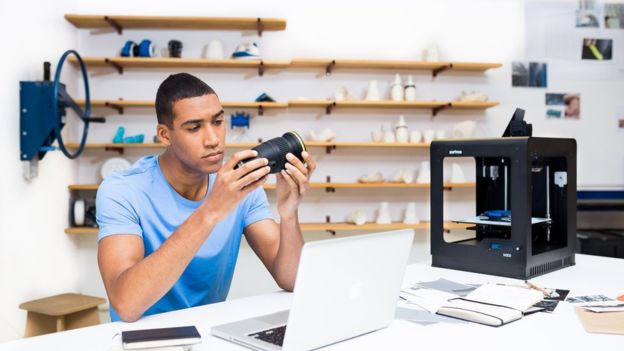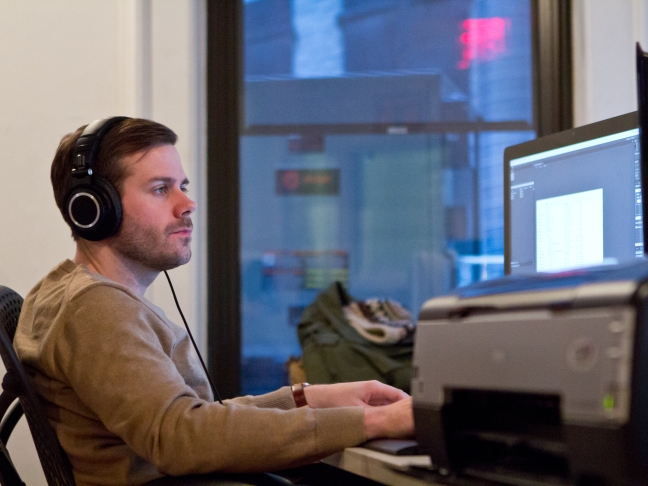Some outstanding examples here of technology helping those with disabilities to succeed in their professions.
Helping those with disabilities to get the job done


Some outstanding examples here of technology helping those with disabilities to succeed in their professions.

The sale of 3D printers is forecast to be worth about £3.5bn this year. Many industry commentators proclaim we are on the verge of a new revolution where 3D printers are common place in our homes. But if we understand that 3D printing is not really printing at all, at least not in the traditional sense, then perhaps we will get a better understanding of how these ‘robots’ will more likely be used in the near future.
3D printing involves the creation of a three-dimensional, solid object from a digital file. It’s a process that really needs you to be a specialist in what you are creating so perhaps the workplace is the more likely arena in which this process will continue to deliver its benefits to us all, as this summary from BBC Business explains

We have written about automation of jobs quite a bit recently and I’m sure we will continue to do so as theory becomes reality. However, after a colleague said that this wasn’t relevant for anyone who ‘thinks up stuff’ in the creative industries, I felt compelled to post a link to a provocative article from Nick Clark, executive creative director of The Partners, a leading brand strategy and design agency.
Maybe my colleague might think again after reading this. The article’s conclusion appears to be that machine learning can learn to produce creative work, so maybe the human role is to guide its direction and output in the first place. What are your views?

Last week we wrote about how to start evaluating if your job is at threat due to it being automated in the future. This week we look at the recent winner of the Financial Times and McKinsey Business Book of the Year, for it gives a more comprehensive overview of the very near future and offers advice and solutions to prepare for it.
There are many who believe this to be a time in our human history when market forces should not be allowed to blindly prevail, and that public policy should dictate the future of our working lives. As the author of the book Martin Ford says himself, “I’m not arguing that the technology is a bad thing. It could be a great thing if the robots did all our jobs and we didn’t have to work. The problem is that your job and income are packaged together. So if you lose your job, you also lose your income, and we don’t have a very good system in place to deal with that.”
We’d be really interested to hear your thoughts upon reading the book. Are Ford’s solutions practical or viable? Only time and collective debate will tell.

OK, hands up who climbs into bed and starts looking at stuff on their phone or tablet? Even worse, hands up who does this with the lights off because their partner is asleep. Right now, I’ve got both hands AND feet in the air 😦
What makes this worse is that I KNOW this is bad for me. I know all the scientific evidence points to the fact that this reduces the quality of my sleep as a team from Harvard Medical School told us just before Christmas last year.
But what’s the solution? Paul Gringas, Professor of children’s sleep medicine and neurodisability at Evelina London has now laid down a challenge to manufacturers of smartphones, tablets, and e-readers saying that they should have an automatic ‘bedtime mode’ to help them stop disrupting people’s sleep
He says that the blue-green light emissions from such devices can stop people falling asleep by up to an hour, which is pretty significant for a long-distance commuter like me!
Software (free software at that) does currently exist to automatically reduce such light emissions from your laptop or desktop in line with the time of sunrise and sunset in your location. It’s called f.lux and you can download it here (I use it myself, so can guarantee it’s an easy process). The software is not yet currently available for smartphones or tablets as the devices would need to be ‘jailbroken’ to install it and you really don’t want to go there. But at the very least, if you like to work late, this is a good solution for at least part of your ‘bright screen’ problem.
Now we just have to hope our voices can be heard to encourage Apple, Samsung, Motorola etc. to address the wider problem with our mobile devices.

Most economists would agree that the single biggest factor affecting the jobs market is the level of technological change. Last week the Bank of England’s Andy Haldane hit the headlines when speaking at the TUC and claiming that 15 million UK jobs were at risk of being replaced by robots.
As this BBC article points out, many of the headlines missed the nuances of Haldane’s speech but it was thought-provoking nonetheless. Have you considered the future of your job in the context of advances in technology? If not, this calculator may kick-start your appraisal of the safety of your job and start you thinking about the value you bring to the jobs market, how you sell yourself and what additional education may be beneficial to you. We’ll be writing about helpful platforms and tools you can use for such purposes in future weeks but for now, we’d be interested to hear from anyone taking steps to safeguard their income considering what jobs are likely to be automated in the very near future.

The Sync Project is a initiative started and run by one of my old colleagues Marko Ahtisari. Marko and his team believe that if music can reach us physically, then we can find a way of decoding what music does, and we could then use it to improve health.
The project itself centres around a platform that maps music characteristics to real-time biometrics gathered from an exploding variety of sensors. The team hope to understand and decode the personalized therapeutic effect of music. Or in layman’s terms – they collect data from things like smartphones, wristbands and smartwatches to help us understand what happens to our brains and bodies when listening to music.
Read more about the purpose of the project here
Right now, I advise doing what I’ve done and simply sign up to see what happens. Up to this point I’ve been getting e-mail updates but I’ll certainly be a willing volunteer (as would my wife and daughter) when the project scales up and starts to have its desired positive impact on all our lives.

Here’s an interesting piece from CEO of Hootsuite Ryan Holmes. For some years now I’ve wondered why on earth I’m handing out or being given business cards. This article looks at various apps and uses of your smartphone that claim to be the solution.
From a personal perspective, it’s clear to me why no technical solution has yet to supercede the phsyical card. If something isn’t universally adopted then you can’t be guaranteed to exchange information with a stranger. No point asking if you can bump phones if the other person looks at you like you’ve lost your mind. For me, LinkedIn has simply replaced the business card – if I’ve had the pleasure of meeting someone new and interesting then I ask to connect with them on LinkedIn as soon as I can on my computer or smartphone app. If they were worth connecting with then there’s zero chance I’m going to forget their face or name. But I accept that method is hardly flawless – what if I was at an event all day and met scores of people?
What technology have you used when meeting this challenge? We’d love to hear your thoughts.

There are, essentially two aspects to my profession. Meeting people and coming up with solutions for them. Both require clear thought and clear explanation but much of the latter aspect requires me to work solo.
Whilst I can control distractions to a certain extent, (turn-off e-mail, close down Facebook, shut the door etc.), my mind is the biggest distraction. I constantly like to think about ‘new stuff’ so I have sometimes had problems focusing on the actual task in front of me until the deadline is so close that I force myself to finish the job. That’s not a productive or healthy way to work.
So when I stumbled upon a service called focus@will, I was intrigued and I was listening. I had used music to try and help me focus before but the trouble was that if it was music I really liked, I just started to hum and sing along and couldn’t concentrate on a deep level. Basically, my approach wasn’t particularly scientific!
It promised that I could, “On mobile, tablet or computer, listen to multiple music channels scientifically optimized to increase concentration and productivity.”
I’m a bit sceptical by nature but it offered a free 15-day trial with no credit card required. So I signed up….WOW!
I had absolutely no hesitation subscribing at the end of the trial (£7.50 per month or less if you pay for a year up front). As you can read on the site itself, your favourite music encourages foot-tapping because it engages you. This service has a library of instrumental music that’s been remastered to enhance your concentration and increase your attention span, all developed in association with leading neuroscientists. It ranges from classical to chill-out to ambient noises and back again and it asks you about your own difficulties in focusing before recommending certain channels. Apparently results show 15% increase in concentration and 400% increase in attention span.
From my own personal experience I can testify that this was, and is, 100% true for me. I gain nothing by sharing this with you – no referral fees or commission etc. This is just a service I found and instantly loved and am now recommending it to you. I simply ask two things of you in return – 1) give it a try 2) do share any experience of similar services or technology you use to focus at work.
Enjoy the increased productivity.

Business travel can be a chore if you can’t create your ‘home from home’ with ease. You’re tired, you might have jetlag, and all you want to do is either relax or get productive without any hassle.
So take a look at this piece which gives you a range of excellent tips and advice on how to make your stay more pleasurable.